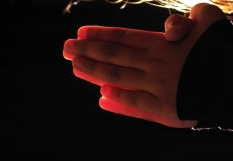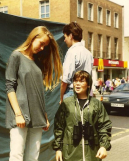It was the best of times, it was the worst of times. Being a school kid in the days of compulsory religious assemblies seemed tough, but the truth is that we never realised just how good we had it. So if the dark, cold beginning of the year is getting you down, allow me to lift your spirits with some nostalgia – a whistlestop tour of some of the great school hymns we were forced to sing in that now much-mourned era. Popularised by the BBC's 'Come and Praise' radio programme and hymn books in the 1980s, these songs, at least in my experience, tend to have a strangely uplifting effect on anyone who remembers them. So – inspired by an impromptu sing-song in the Youthscape offices earlier this week, may I present ten of the very best...
1. "When a knight won his spurs"
One of the all-time classic assembly hymns, this was actually a really long-winded way of making a fairly simple point: that while we're not medieval knights, we still take part in some sort of 'fight' against the bad things in our world. There's no real religious content until the third verse, which makes sense of the fantasy lyrics of the first two, and which somewhat hilariously on reflection, my school used to skip. Scores points for being the only hymn ever to include the word "ogre".
2. "One more step along the world I go"
Another very simple message in this one, that we're not alone on the journey of life. There are five verses reiterating that message, each culminating with the lines "it's from the old I travel to the new, keep me travelling along with you." Apparently this is sometimes still used at funerals, which has always seemed a bit odd to me – it's a struggle to sing the repeated refrain without getting quite raucous.
3. "Give me oil in my lamp"
Like the ballad of the spur-winning knight, this is a song which relies on a strong appreciation of metaphor. It's about asking God to keep your lamp oily, and if I'm honest, I still don't know what that means. The hymn was perhaps most memorable for being impossible to fully learn; the lyrics changed on the last line of the chorus from 'king of kings' to just 'king', and so at some point everyone made the humiliating mistake of singing on when everyone else had stopped. Charmingly, this hymn was also rebranded as an offensive football chant in the 1980s.
4. "Think of a world without any flowers"
If you went to school on Monday morning feeling full of the joys of the weekend, you could guarantee this one would bring you back down to earth with a bump. It invited pupils to re-imagine the world as a sort of post-apocalyptic wasteland, where nothing would grow, the animals and fish were all dead, and no-one could survive. Then you'd thank God that this wasn't actually the world we live in, but the damage was done. The stuff of nightmares, and very possibly the original inspiration for Cormac McCarthy's The Road.
5. "Kumbayah"
I mean let's be honest: what was this all about? Apparently the main thrust is a call to God to "come by here" and help those in need; semi-interestingly there's some debate about the linguistic origin of the song (it might be Angolan). There are many different versions of this campfire classic, recorded by bands in the 50s, 60s and 70s with names like The Woodturners and the Pan Pipe Men. In all honesty I'm not sure I've ever met anyone who likes the song, but that didn't stop Mr Finch from inflicting it on us on a weekly basis.
6. "Lord of the Dance"
Well this is a proper one. The school hymn that sent Michael Flatley on his way to being a superstar, it gave us the entire gospel narrative, wrapped up in a folksy tune with some folksy imagery about life as a dance. Now that I understand the sufferings of Christ more clearly than I did aged seven, I feel a little bit guilty for how much we enjoyed singing "they whipped and they stripped and they hung me on high", but nevertheless this arguably remains the crown prince of school assembly songs.
7. "When I needed a neighbour"
If you sang this at school, and you didn't snigger during the "I was cold, I was naked" line, then you're either a liar or a better person than most. This was a song about demonstrating the love of God, Samaritan-like, to the needy, the hungry and the homeless. It's based around Jesus' "whatever you did for the least of these, you did for me" idea but it never explicitly says so; like so many of this hymns it just assumes you know we're singing about God. We didn't really get that at school, because – understandably – we were completely distracted by the idea of someone being starkers.
8. "Have you heard the raindrops drumming on the rooftops?"
Otherwise known as "The Water of Life", like so many other of the songs on this list, this takes one idea and then milks it for all it's worth – and then a bit more. There's not a huge connection between the verses (all about where we get actual water from), and the chorus (about Jesus as the water of life), but when you're writing for the under 11s, I suppose you probably guess you can get away with combining things which vaguely sound the same.
9. "Colours of day dawn into the mind"
This one is a departure from all the awkward metaphor, presenting as it does a full on evangelical rallying call to "go down to the city, into the street, and let's give the message to the people we meet." Overall it's a pretty good and theologically-correct hymn, although it does worryingly suggest that "the people of darkness are needing a friend." Whether that's rather judgmentally rebranding non-Christians, or suggesting primary school-aged children should go and befriend a serious criminal is unclear; either way it seems unwise.
10. "Who put the colours in the rainbow?"
They'd never get away with this one now. A full on creationist treatise about God making not only the rainbow, the sea and the snowflake, but also whales, snails, quails, hogs, dogs and frogs, this was always the one that would send an excited cry of "yessssss" rippling around the school hall when it appeared on the overhead projector. Innovative because it is almost entirely composed of questions, and because it dares to rhyme "seas" with "leaves". My favourite.
That's it for the moment. There's almost certainly more mileage here, but for now, I trust I've successfully ear-wormed your day with at least one nonsensical folk anthem that's light on theology but big on nostalgia.
Martin Saunders is a Contributing Editor for Christian Today and the Deputy CEO of Youthscape. You can follow him on Twitter: @martinsaunders
















